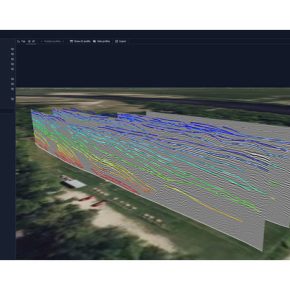Advanced GPR Data Processing Workshop
Dr. Lawrence Conyers and GSSI bring together a diverse international group of GPR archaeology practitioners to learn advanced data processing and interpretation techniques.

GSSI recently held a three-month online intensive workshop on Ground Penetrating Radar (GPR) for archeology customers, led by expert Dr. Lawrence Conyers, Graduate Studies Director and Professor of Archaeology at the University of Denver. In the field of archaeology, Ground Penetrating Radar (GPR) is a key tool for non-invasive site investigation.
The Advanced GPR Workshop allowed GPR practitioners from around the globe to connect and discuss techniques for data processing techniques, interpretation and presentation, and to collaborate in understanding complex datasets. The geophysical world can be quite insular and regionally constrained, and the workshop allowed participants to create long-lasting connections with folks from different backgrounds and skill levels that may not have formed otherwise.
Dr. Conyers challenged participants to go beyond processing datasets using typical, preordained steps and instead to “dig into” datasets to achieve a more robust interpretation of slice-maps through profile analysis, trace analysis, and the study of specific frequencies of the waves and their phases. The goal is to tailor the data processing and interpretation to the particular context, making informed decisions to develop a context-specific methodology based upon the site’s particular archeology, soils, and geology and the project’s research questions.
The workshop was offered free of charge to GSSI customers from December 2021 to March 2022. It consisted of a weekly forum to learn new data processing and interpretation techniques, weekly datasets for participants to process and present on the following week, and regular office hours led by Dr. Conyers and Lauren Couey from GSSI.
Archaeological datasets were provided to participants each week to process and present their results the following week. These datasets challenged participants to understand and apply advanced processing methods including 3D grid creation, frequency filtering, surface normalization, layer picking, contour mapping, combining GPR and magnetometry data, measuring 3D volume, and interpreting 2D reflection profiles. Additionally, during office hours, participants received extra support navigating post-processing software including GSSI’s RADAN 7 and GPR Viewer, free software developed by Dr. Conyers.
The workshop also provided an opportunity to network with other archeology professionals in the area of GPR, with one participating stating, “Beyond just learning new processing techniques and getting deeper into radar theory, I am thankful that workshops like this help ‘standardize’ the way the radar community approaches studies using GPR. I think having everybody on the same page can really move this industry forward, both in practice and in publication.”
The radar community that joined the workshop consisted of a diverse group of archeologists and professionals engaged in the management of archeological resources from all over North America and from South America and Europe.
GSSI is proud to have supported such a successful workshop and networking opportunity. Videos of workshop sessions and other content is available at www.gpr-archaeology.com/gpr_workshop.




